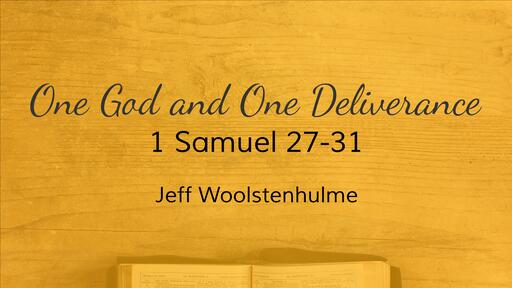1 Samuel 31
Sermon • Submitted • Presented
0 ratings
· 9 viewsNotes
Transcript
The Tragic End: Lessons from the Death of Saul
The Tragic End: Lessons from the Death of Saul
Bible Passage: 1 Samuel 31
Bible Passage: 1 Samuel 31
Summary: 1 Samuel 31 recounts the tragic demise of King Saul during battle against the Philistines, illustrating the consequences of disobedience to God and the inevitable judgment that follows.
Application: This passage serves as a stark reminder of the importance of obedience to God, and encourages believers to reflect on their own lives to ensure they are following God's calling rather than their own pride or fears. It prompts individuals to evaluate their relationship with God, particularly in times of crisis.
Teaching: Saul's life and death teach us about the critical nature of faithfulness to God and the dangers of pride and disobedience. It emphasizes that turning away from God leads not only to personal ruin but also to the loss of purpose and legacy.
How this passage could point to Christ: While Saul represents a failed king who fell from grace, this sets the stage for the anointing of David, ultimately leading to the lineage of Christ. Christ is our ultimate King who perfectly fulfills God’s will.
Big Idea: Faithfulness to God is paramount; forsaking it leads to destruction and despair, but God’s greater plan prevails through even our greatest failures.
Recommended Study: As you prepare this sermon, consider using Logos to examine the historical context of Saul's reign and the theological implications of his disobedience. Look into the Hebrew text for nuances in Saul's actions and examine commentaries that address the challenges of interpreting his legacy. Additionally, it may be fruitful to study parallels between Saul and David, as well as Christ's fulfillment of kingship in contrast to Saul's failures.
1. Fall of the Fallen King
1. Fall of the Fallen King
1 Samuel 31:1-4
You could delve into how the Israelites' defeat symbolizes the consequences of living outside of God's commands. Saul's refusal to fully obey led to despair, which manifested in the ultimate defeat. Maybe emphasize how Saul's wounded state reflects his spiritual brokenness and the perils of pride. This point encourages self-examination to reinforce the importance of aligning one's life with God's will to prevent personal downfalls.
2. Fateful Retreat and Consequence
2. Fateful Retreat and Consequence
1 Samuel 31:5-7
Perhaps highlight the loyalty of Saul's armor-bearer and how misplaced loyalties, when combined with fear, can lead to their own demise. Saul's death indirectly causes the scattering of the Israelites and vulnerability to further Philistine advances. This point might stress the impactful leadership roles individuals possess, and how faith and courage can lead communities, unlike Saul's retreat to cowardice.
3. Failed Legacy Exposed
3. Failed Legacy Exposed
1 Samuel 31:8-10
You could explore how the Philistines' desecration of Saul's body was a display of triumph over God's chosen nation, forewarned as a humiliation through disobedience. Saul’s downfall symbolizes the spiritual devastation that occurs when leaders stray from God's covenant. Reinforce to the congregation that our actions reflect not only on ourselves but also on the faith community. This is an appeal for strong, faith-based integrity.
4. Faithful Acts Amidst Defeat
4. Faithful Acts Amidst Defeat
1 Samuel 31:11-13
Finally, reflect on the courage of the men of Jabesh-gilead as a sign of hope and respect for Saul's initial good deeds. Their bravery in retrieving his body offers a gloom amidst despair, pointing to redemption and restoration. Highlight how this act prefigures the ultimate restoration through the lineage of David to Jesus, pointing to the greater king who redeems with justice and mercy—Christ.
ADVERTISEMENT
Related Media
See moreRelated Sermons
See more

Bethany Baptist Church • 14 views • 44:33


Christian Mölk • 13 views



